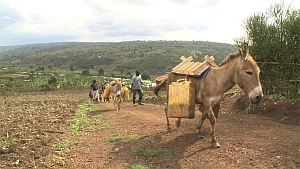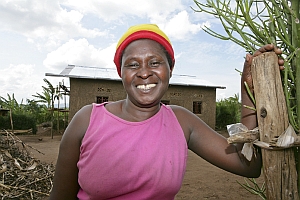
In partnership with CREDI, a local Rwandan development organisation, with funding from the Good Gifts Catalogue, SURF has recently launched a rural women’s empowerment project with donkeys.
Donkeys are not native to Rwanda, but following yearlong research, we identified a breed of donkeys from Northern Uganda which we imported to the Eastern Region. Beneficiaries were identified in three districts – Rwamagana, Rulindo and Gatsibo – and 23 donkeys were distributed from the initial transport.

We met with one of the beneficiaries – Evelyn Uwimanana – a remarkable widow of the genocide and member of AVEGA. She is President of Coopag, an agricultural cooperative of 947 people (of which 480 are survivors). CREDI is assisting Coopag to build their capacity, of which the new donkey project is part of their diversification strategy.
The impact of the project has already been significant. The first phase of the project is training the donkeys in packing. This alleviates women, and children, to bear the burden of the load of transporting water, firewood, food and goods.
One donkey can carry up to 120 20-litre jerry cans of water a day. They can carry as much firewood, as four people. As well, they produce fertiliser at no cost to the beneficiary, which previously they had to buy.
For Evelyn, this has already transformed her life. Evelyn has been able to build a house on her land – as a result of the cost of bricks decreasing from 70 to 20 FRW due to the improved access to water to manufacture them locally. She no longer has to pay the 45,000 FRW for fertiliser for her garden.
“Before the donkeys came we used to fetch water from dawn to 11am. But now the donkeys fetch the water and we can spend the time trading on the market.”

For Evelyn, whose children were killed in the genocide, her donkey has an added benefit:
“We communicate very well. I can talk to her, summon her and she will listen just like my children once did.”
The project, a preliminary report appended, the first of its kind in Rwanda has already received national coverage, and will prove to be a model for the second transport of donkeys planned early next year. As well, there will be a second phase of training, as Evelyn’s donkey and the other donkeys in the Eastern Region are taught to plough. Evelyn cannot wait!
